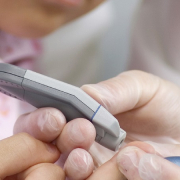How far we’ve come, how far we’ll go: 10 years of the GEP
The Genomics Education Programme (GEP) began in the summer of 2014 with big dreams, a small team and a lot of work to do
Ten years ago, genomics was having a moment in the NHS, following the government’s announcement of an ambitious initiative: the 100,000 Genomes Project.
Genetics had long been a part of the health service in England, but this was something different: whole genome sequencing (WGS) available at scale within the NHS for the first time.
Zero to 100,000
The project, led by a new publicly owned company Genomics England in partnership with the NHS, set out to sequence the genomes of 100,000 patients and family members in a bid to be the “first country in the world to introduce [WGS] technology within a mainstream health system” and “help develop life-saving new drugs, treatments and scientific breakthroughs”.
The 100,000 target was achieved in just five years, in huge part thanks to the tireless efforts of NHS healthcare professionals across 13 NHS Genomic Medicine Centres (GMCs). They identified, recruited and tested tens of thousands of patients and their families, then validated and fed back the results.
The impact of the project was transformational for many patients: up to 25% of those with a rare disease received actionable findings, while around half of cancer cases showed the potential for a therapy or clinical trial. For others, like Claudia and Trent, the answers unfortunately did not come. But hope remains, with researchers continuing to work with 100,000 Genomes Project data in pursuit of new diagnoses and discoveries.
Implementing such a major initiative in the NHS meant adopting new pathways and ways of working – which, in turn, required education and training of the healthcare workforce. Professor Sue Hill (not yet a dame) entrusted Val Davison – former head of the National School of Healthcare Science – with establishing a national programme to deliver education and training opportunities for the NHS workforce. Hosted by Health Education England (HEE) in Birmingham, the GEP was born in June 2014.
A flying start
Val and consultant clinical scientist Dr Anneke Seller, supported by project managers Joanna Davies and Ann-Marie Wright, were joined by a small team of education and content specialists from the former NHS National Genetics Education and Development Centre: Michelle Bishop, Sandie Gay, Áine Kelly, Michelle Madeley, Stuart Sutherland and Tim Packwood. The team hit the ground running by launching a new website, releasing an awareness-raising film presented by broadcaster Viv Parry, starting an educational blog, and creating two popular introductory courses, Introduction to Genomics and Introduction to Bioinformatics.
Attention then turned to supporting the 100,000 Genomes Project, which was preparing to recruit participants from spring 2015. In collaboration with a working group of genetic counsellors, and particular input from Dr Anna Middleton and Dr Christine Patch, the GEP team built the first in a sizable list of 100,000 Genomes Project courses and resources: Preparing for the Consent Conversation. This was later supplemented by a national consent training day.
Then followed a collection of films on sample handling and DNA extraction to support laboratory colleagues, a digital pathology course on tumour assessment for genomic sequencing in collaboration with Dr David Gonzalez de Castro, and HEE’s first MOOC (massive open online course), which offered an accessible deep dive into whole genome sequencing. Other notable resources included guides to support clinicians returning results to patients and the popular Eligibility Wheels – developed with Dr Julian Barwell and team at University Hospitals Leicester.
Beyond the 100k
Of course, it wasn’t all about the 100,000 Genomes Project in those early years. The Master’s in Genomic Medicine programme was a huge milestone – the first multi-professional Master’s in HEE’s history, bringing together doctors, nurses, midwives, healthcare scientists and many others as a cohort of postgraduate learners.
The Master’s curriculum was developed by the GEP team in collaboration with a multidisciplinary working group, and modules delivered by a network of Russell Group universities across the country. In the first five years, around 2,000 NHS staff were funded to study more than 10,000 modules. About 650 of those achieved a full Master’s degree. And the numbers have only grown since then.
It has been gratifying to see the positive impact of the Master’s framework on the wider NHS as the genomics Master’s alumni use their knowledge to drive service improvements, enhance patient care and even shape their careers.
Other achievements by the GEP back then included launching a pair of moving films for Rare Disease Day 2015 and funding a network of education and training leads across the 13 NHS GMCs.
The team also hit the healthcare conference circuit, with the goal of raising awareness of genomics among GPs, nurses and midwives. In the early days, we lost count of the number of times a conference attendee would walk towards our stand, take one look at the word ‘genomics’ and swiftly veer away. One memorable interaction involved an irate delegate demanding to know why the NHS had a eugenics programme. He was swiftly corrected! Over time, though, the confusion gradually turned to curiosity and – eventually – flashes of familiarity.
All change
The early years of the GEP featured some other notable moments: in 2015, scientific adviser Val Davison was awarded an MBE for services to genomic technologies, and the following year Val passed the GEP baton to colleague Dr Anneke Seller. Anneke capably led the team through further development of resources to support the 100,000 Genomes Project and beyond.
These included the popular Genomics 101 series, which to date has had more than 52,000 course completions, followed by the launch of our Bitesize Genomics collection, a series of family history training films, and the Genomics Game. The GEP also established a research and innovation fellowship scheme, which welcomed nine fellows at a reception in the House of Lords.
As well as a change in leadership, there was also change among the team, with new additions of Alison Pope (programme management); Charlotte Szczepanik and Claire Healy (administration); Charlotte Murray (stakeholder engagement); Amelia McPherson (editorial); Dr Ed Miller and Dr Siobhan Simpson (education development); and Kathleen Lynch and David Callaghan (project management), among others. It’s a testament to the team that almost all of these brilliant individuals are still members of the GEP today.
Generation Genome
With the 100,000 Genomes Project demonstrating the value of integrating genomic sequencing into routine healthcare, attention turned to what would follow next. In 2017, chief medical officer Dame Sally Davies released her annual report, Generation Genome, which made several recommendations around widening access to genomic services. A year later, the NHS Genomic Medicine Service (GMS) was announced, spearheaded by Professor Dame Sue Hill, who was recognised in the Queen’s birthday honours list that same year.
The GMS created equity of access to genomic testing for the first time in the NHS in England through the National Genomic Test Directory. This was followed by the establishment of seven regional Genomic Laboratory Hubs and Genomic Medicine Service Alliances.
So the work of the GEP continued. Another notable milestone was the first #GenomicsConversation campaign, which launched in March 2018 with a social media ‘thunderclap’. (IYKYK) Outreach among professional groups and bodies was a priority, and particular successes included the Nursing and Midwifery Round Table initiative and the launch of our Genomics in Healthcare series of specialty-specific films. The GEP was even shortlisted for a Health Service Journal award, which meant a rare chance to dig out the glad rags.
Challenges to come
As we approached the 2020s, the GEP began work on an exciting new project, GeNotes (genomic notes for clinicians). The test directory was a milestone achievement for the NHS, broadening access to genomic testing beyond specialist genetics clinics. But it was not without challenge for even seasoned medical consultants, many of whom were now ordering genomic tests for the first time.
To address this emerging educational need, Professor Kate Tatton-Brown, a consultant clinical geneticist at St George’s, conceived the idea of creating digital notecards that would support a clinician in ordering a genomic test based on a clinical presentation. She approached the GEP with the proposal and the team then embarked on a research project with prospective users to test out assumptions and refine the content and delivery model. Initial results were promising, leading to successful rounds of alpha and private beta testing.
But then came news of a devastating new coronavirus strain emerging in China, and within a few short months the NHS was facing its greatest challenge yet.
As colleagues from genetics services – including GEP scientific director Anneke – were reallocated to the Covid-19 efforts, progress slowed on GeNotes and many other projects requiring external subject matter expertise. The remaining GEP team pushed on as best they could, not least new project editor Ben Armstrong, who spent just one day in the office before HEE sent everyone home. The team rapidly adapted to the new world of remote working and found creative ways to work within social distancing rules, such as developing a series of surprisingly good-quality educational films via video call.
In time, as the NHS – and the world – began to rebuild and recover, it was time for a new phase for the GEP.
New growth
To the team, 2022 felt like somewhat of a turning point. It was clear that recognition of – and interest in – genomics among healthcare professionals was gaining ground. This was boosted when NHS England published its strategy, Accelerating genomic medicine in the NHS.
Meanwhile, after proving a hit in user testing, the team launched GeNotes with a collection of oncology resources devised by one of its expert working groups.
Also in 2022, the GEP received approval to move forward with its proposal to establish the national Genomics Training Academy (GTAC), to help increase capacity and capability among the specialist genomics workforce.
And there was more change to come… In the autumn of 2022, Anneke stepped down from her role at the helm of the GEP, leaving big (and very stylish) shoes to fill. Luckily, a perfect fit came in the form of Professor Kate Tatton-Brown, who arrived with boundless energy and big ideas, such as a collection of FutureLearn courses on genomic testing.
It was also time to welcome several other new faces, including Mayesha Akhtar (administration), Mel Watson, Dr Amy Frost and Dr Danielle Bogue (education), and Louise Summerling and Elliott Williams (editorial). Plans to put together a team to deliver the GTAC were also underway.
Now, and next
The past year has been one of the GEP’s busiest yet, with seven more GeNotes specialties launching, the publication of the first Clinical Pathway Initiative (CPI) projects, the GEP’s first international education and training summit, and the development of our first immersive reality training modules.
The work to establish GTAC has also continued apace, with the team developing the infrastructure, governance, capacity and expertise needed to devise and deliver digital education and training for the specialist genomics workforce.
The GEP has also been welcomed to a new home, following the transition of HEE into the new NHS England. Though not without challenges, the change of setting has meant closer working relationships and better connections with many colleagues and teams.
So what is next for the Genomics Education Programme? GTAC is front and centre of our minds, as we prepare to make education and training available to learners this year. GeNotes, the CPI, and many other projects will deliver more resources to support the workforce. And, of course, this week marks our seventh annual #GenomicsConversation campaign, which we hope will be our best yet.
The work to educate and train NHS professionals in genomics continues, as it has for the past 10 years. It is challenging, requires resourcefulness and creativity, and keeps us on our toes. And we wouldn’t have it any other way.









